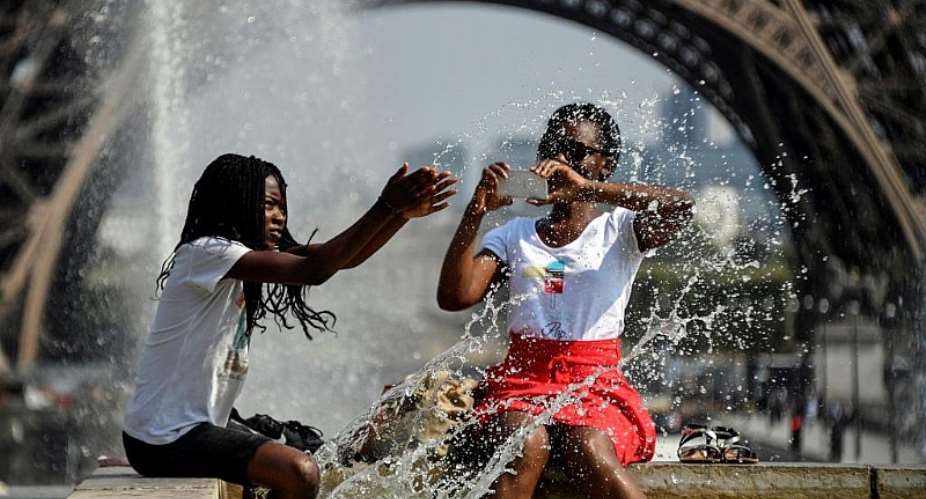French cities including the capital Paris have taken measures to avoid a repeat of a deadly heatwave of summer 2003 as unprecedented high temperatures sweep over continental Europe this week.
French weather service Météo-France predicted a heatwave that set in Monday would last at least six days, with temperatures reaching 40 degrees in some regions by mid-week.
State officials in the Paris region activated an orange alert, the third of four alert levels for elevated heat.
Paris city officials meanwhile announced phone surveillance and cooling rooms for seniors, supplementary housing for the homeless, fans in schools and nurseries, opening of parks and gardens during the evening and water misters in public places.
Across France, final middle school exams, the national brevet diploma for 15-year-olds, have been postponed until early next week, announced education minister Jean-Michel Blanquer. They had been scheduled for Thursday and Friday, when the mercury will peak.
Alert systems for high heat were introduced following the summer of 2003, when some 15,000 people died, many of them older people in apartments and rooms that were not air conditioned.
“Everything is ready in retirement homes, in hospitals, in transports,” said French Health Minister Agnes Buzyn, who also urged the public not to underestimate the effects of extreme heat.
“When people are fragile, even when everything is organised, there is always a higher mortality rate,” she warned.
Urban heat islands
Climatologists warned that people living in cities are particularly vulnerable due to the way that concrete buildings and asphalt roads absorb heat, even at night.
“In the centre of Paris, the temperature could be three or four degrees higher than in the suburbs, or even five to 10 degrees over the surrounding region,” climate scientist Jean Jouzel told RFI.
“The effects of urban heat islands are felt day and night, because the nights are generally not very cool in cities, such as central Paris.”
The heat wave comes at the time of year that days are longest, meaning there will be less time for overnight cooling.
Between Wednesday and Friday, temperatures are expected to remain above 20 degrees at night-time, said Météo-France.
The government said it would test new measures to limit the most polluting vehicles from the roads in and around Paris.
Air pollution adds another layer of risk for residents of cities, where the air quality is down due to greater numbers of high-emitting vehicles.
“In periods of extreme heat, like that of 2003, there was a sharing, when it comes to mortality, between the direct effect of the heat itself and the indirect effect of the quality of the air,” French climate scientist Hervé Le Treut told RFI.
Climate change making heat waves more frequent
Météo-France emphasised there was little historical precedent for such a heat wave at this time of year and that the current period would exceed the four days of high heat recorded in June 2017.
“The period to come is expected to be more intense, unprecedented for a month of June,” the forecaster said.
“Heat waves generally affect the Hexagon (France) between early July and mid-August,” the monitor said in a statement. “However, in recent years, France has seen periods of high heat earlier and later… They are twice as frequent over the 34 last years than the previous period.
“In France, their frequency and intensity is expected to rise over the course of the century. The frequency of these events will double by 2050.”
The Potsdam Institute for Climate Impact Research near Berlin in Germany said the five hottest summers in Europe since the year 1500 have all happened since 2003.
“Monthly heat records all over the globe occur five times as often today as they would in a stable climate,” said Stefan Rahmstof of the institute in a statement.
“This increase in heat extremes is just as predicted by climate science, as a consequence of global warming, caused by the increasing greenhouse gases from burning coal, oil and gas.”
(with newswires)





 Minority will expose the beneficial owners of SML, recover funds paid to company...
Minority will expose the beneficial owners of SML, recover funds paid to company...
 Prof. Opoku-Agyemang has ‘decapitated’ the NPP’s strategies; don’t take them ser...
Prof. Opoku-Agyemang has ‘decapitated’ the NPP’s strategies; don’t take them ser...
 Abubakar Tahiru: Ghanaian environmental activist sets world record by hugging 1,...
Abubakar Tahiru: Ghanaian environmental activist sets world record by hugging 1,...
 Prof. Naana Opoku-Agyemang will serve you with dignity, courage, and integrity a...
Prof. Naana Opoku-Agyemang will serve you with dignity, courage, and integrity a...
 Rectify salary anomalies to reduce tension and possible strike action in public ...
Rectify salary anomalies to reduce tension and possible strike action in public ...
 Stop all projects and fix ‘dumsor’ — Professor Charles Marfo to Akufo-Addo
Stop all projects and fix ‘dumsor’ — Professor Charles Marfo to Akufo-Addo
 Blue and white painted schools will attract dirt shortly – Kofi Asare
Blue and white painted schools will attract dirt shortly – Kofi Asare
 I endorse cost-sharing for free SHS, we should prioritise to know who can pay - ...
I endorse cost-sharing for free SHS, we should prioritise to know who can pay - ...
 See the four arsonists who petrol-bombed Labone-based CMG
See the four arsonists who petrol-bombed Labone-based CMG
 Mahama coming back because Akufo-Addo has failed, he hasn't performed more than ...
Mahama coming back because Akufo-Addo has failed, he hasn't performed more than ...
